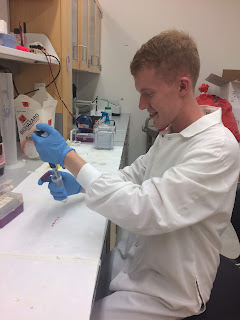 What most interested me to get involved with this project was the idea that Dr. Hakami’s lab looks at applications of exosomes as possibly new modes of therapy and vaccine delivery. Additionally, they work with primarily bacteria which establish an infection within cells. Both of these topics seemed very interesting to me, especially if, as a scientist, I am able to take part in the next development of medicine that helps save the lives of people around the world.
What most interested me to get involved with this project was the idea that Dr. Hakami’s lab looks at applications of exosomes as possibly new modes of therapy and vaccine delivery. Additionally, they work with primarily bacteria which establish an infection within cells. Both of these topics seemed very interesting to me, especially if, as a scientist, I am able to take part in the next development of medicine that helps save the lives of people around the world.
I see this project being related to my long-term goals in the sense that I both am contributing to research that may ultimately help people around the world, and due to the fact that the two bacteria we work with presently disproportionately impact populations who might not have the necessary medical care to address infections such as these. With this in mind, the fact that I eventually want to work in the field of infectious disease epidemiology, with a focus on diseases that are “neglected” by medical research, work with these bacteria is a perfect fit for me.
My weeks are pretty busy in the lab and vary from week to week. On Mondays, I run a sucrose gradient for exosome purification – a process that altogether takes 5 hours. On Mondays, I also set up any plates, flasks, or bacterial cultures that I will do experiments on later in the week. Tuesdays typically consist of an entire infection for the purpose of exosome production for our stockpile. Wednesdays I start another infection for exosome production, while Thursdays and Fridays are mostly extracellular vesicle purifications, a 4-hour process each day. Randomly throughout the weeks, I will run western blots, bacterial uptake, and clearance assays, and sample preps for other analyses such as flow cytometry, all while continuously checking on all of the lab items stock and creating order forms for anything that might be running low.
One thing I have discovered this term is the differential expression of CD68 and p38 in differing cell treatments.
